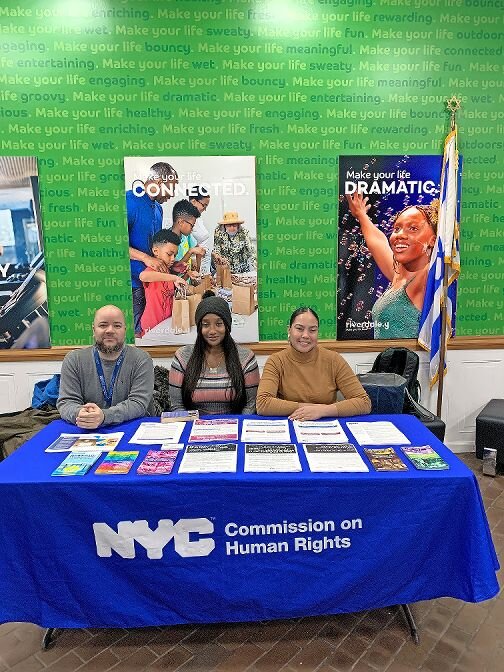Human rights outreach going on at Riverdale Y
As hate crimes rise, commission needed more than ever
Hate crimes and hate speech has seen an increase in the first three weeks of January, leading up to an educational visit to Riverdale from the New York City Commission on Human Rights.
New York City has seen 17 hate crimes reported thus far in January. In December the police reported seeing a 26 percent increase in such crimes over the same time a year ago.
The New York City Commission on Human Rights, which is formally tasked with enforcing the city’s human rights code Title 8, educates residents and fosters healthy communities.
Orlando Torres, managing director of outreach and racial justice at the commission, spent some time at the Riverdale Y Jan. 19 stopping passersby to inform them of their rights as city residents. Typical cases of discrimination and harassment he sees occur while people are looking for an apartment, going to the park, applying for a job, or shopping in a store.
“We want to make sure people are aware of what the commission does and educate New York City residents on their rights and responsibilities,” Torres said.
Torres said that the Bronx division of the human rights commission typically has a table set up three to four times a week in Riverdale.
“The workshops are really impactful and special,” said Claire Gross, the commission’s media and public relations manager. “Every single one is founded in the belief that any kind of discrimination against one kind of group harms every group. We’re all in this together.” The workshops are an invitation for people to have longer conversations and truly discuss the discrimination they feel they are facing. Attendees are free to ask questions and bring their own issues to the table. These discussions provide the opportunity for bureau members to decide if residents should be directed to the law enforcement bureau of the commission where complaints can be investigated and followed through with prosecution.
Torres believed that the ultimate goal of their outreach is for interactions to translate into people utilizing the other bureaus of the agency that are available.
City human rights law offers protection to the following classes: age, immigration or citizenship status, color, disability, gender, gender identity, marital and partnership status, national origin, pregnancy and lactation accommodations, race, religion or creed, height and weight, sexual orientation, and veteran or military service status. Other protections are included for employment or housing and the law clearly defines retaliation against a protected class is not permitted.
From June 2022 to June 2023, more than 12,000 people looking for assistance contacted the commission. The commission is divided into law enforcement and community relations.
The Office for the Prevention of Hate Crimes offers community project grants to encourage individuals, groups, non-profits, academic institutions, and other entities residing in the city to invest in their communities while addressing discrimination and bias or hate-motivated acts.
Grants can reach up to $10,000 and the funded projects must be in full effect by May of this year. Accepted projects can include community workshops, videos, events, conferences, and social media campaigns. The project must promote community respect and unity while dispelling hate violence.
Commission members go to businesses to remind employees and employers of their rights. Torres explained that businesses fall into their jurisdiction twice, being places of employment and also places of public accommodation, which makes their small business outreach vital.
The commission often tries to come to peaceable agreements between the involved parties. In the case of someone experiencing discrimination when it comes to applying for housing with a federal Section 8 voucher, they would go directly to the agency denying them the housing.
“We know what’s at stake when people come to us — its stable employment, its safe housing, its access to enjoy all that the city has to offer,” Gross said.
Time is very precious in these cases. Gross added that most of the cases are settled or handled through intervention.
Torres, who has lived in the city for many years, says he takes his job very seriously.
“New York City means everything to me personally so making it better by making it more equitable and fair and sustainable for everyone,” he said, “there is no more important thing I could be doing with my time.”







